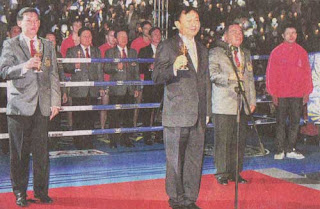 Things are getting more confusing each day with the ruling party’s plan to amend the constitution. Trouble is just around the corner and the political landscape is littered with new political time-bombs.
Things are getting more confusing each day with the ruling party’s plan to amend the constitution. Trouble is just around the corner and the political landscape is littered with new political time-bombs.As the scheme proceeds, the conflict isn’t confined to a confrontation between the government and opposition anymore. Pheu Thai and the Democrats are natural opponents on this case but for Thaksin Shinawatra and Jatuporn Prompan, speaking for the red-shirt movement, to be airing divergent strategies is a sign of further political turbulence.
Former Premier Thaksin did another “phone-in” Saturday evening to the huge gathering of red-shirts who were organizing an “anti-coup concert” at Khao Yai resort, insisting that all effort must be exerted to press ahead with the much-hyped referendum.
He shot down skepticism from some of his own party members and red-shirt leaders that it would be almost impossible to get half of the voters to cast “yes” ballots even if half of the eligible voters (estimated at 49 million next year) showed up as required by the constitution.
“To get 24.3 million votes for the referendum is a walkover,” Thaksin declared, arguing that for Pheu Thai Party to force a vote on the third and final reading on the pending charter amendment bill without a referendum would be too risky. He suggested that the ruling party might not get sufficient votes to pass the bill – and even if that obstacle was overcome, there is still the risk of running afoul of the Constitutional Court’s earlier ruling that a referendum would legitimize the move.
But Jaturporn, one of Thaksin’s closest advocates, was calling for a different course of action that runs counter to Thaksin’s tactics. He said to go ahead with the referendum would be to partake in a “war that we will lose.”
He said Pheu Thai should avoid a losing war called “referendum” and must move ahead to a decisive end with the vote in Parliament to rewrite the whole charter. In other words, the red-shirt movement is against the referendum or even a article-by-article amendment as had been proposed as alternatives by other factions in the ruling party.
Where does Premier Yingluck Shinawatra stand then? Nobody is quite sure. Perhaps, she isn’t quite certain herself as to what the next step should be. The party is divided. The red-shirts are putting pressure on the party. The party is supposed to follow Thaksin’s instruction. But the core members are split between caution and going all-out.
Officially, a panel set up by the party has vowed to move ahead with a plan to hold a referendum, brushing aside a proposal to amend the charter section by section. That sounds like the official party line. But upon closer scrutiny, that isn’t necessarily the case.
Chalerm Yoobamrung, deputy premier, is publicly against the referendum. He prefers to seek changes article by article to avoid a new political stalemate in the face of strong opposition against a total overhaul. He runs against another faction within the party that calls for a total rewriting of the charter.
What a total “overhaul” of the constitution means is basically to offer a higher degree of influence to the political power-that-be and to reduce the authority of independent agencies that are supposed to serve as checks and balances against “parliamentary dictatorship” or “tyranny of the majority.”
Opposition leader Abhisit Vejjajiva of course knows exactly what Thaksin is after. He claimed that Pheu Thai’s sole purpose was to alter Article 309 of the 2007 charter which deals with the actions of the 2006 coup-makers who had thrown out Thaksin. If this particular stipulation was removed from the new charter, all legal actions taken against Thaksin since the coup would be automatically made null and void.
And that alone could plunge the country into another period of turmoil. Opponents to the Pheu Thai move could be radicalized once again. The worst-case scenario would inevitably raise its specter once again.
If past behavior is any indication, Thaksin may yet change his tactics. Warnings have emerged from various quarters – not confined to hard-core opponents of the current government – that the road ahead for a referendum is shot through with holes and surviving the political minefield is an uphill task if not impossible.
Premier Yingluck gave some hints of a possible about-turn on Tuesday when she told reporters that if 24 million voters could be found to vote in favour of a total rewrite of the charter, “we will revert to amending the constitution article by article.”
The referendum is estimated to cost tax-payers Bt2 billion. But the higher price to pay in case of a failed referendum is another prolonged period of political confrontation. The damage would be incalculable








